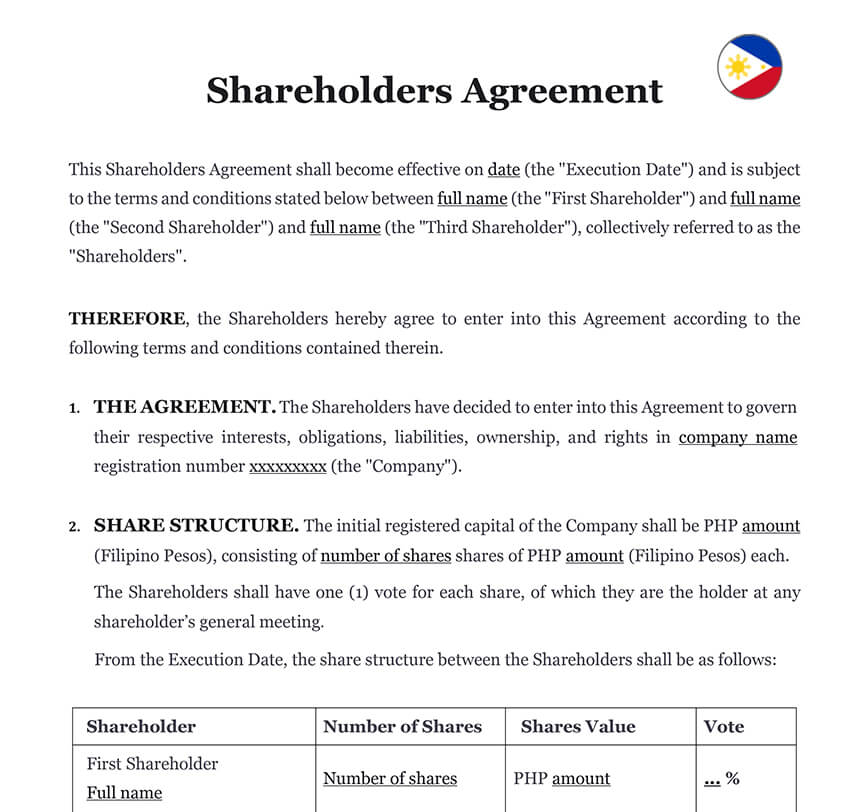What is the legal framework for shareholder obligations in the Philippines?
In the Philippines, the legal framework for shareholder obligations is primarily governed by the Corporation Code of the Philippines. This code sets out the rights, duties, and responsibilities of shareholders in Philippine corporations. It establishes the rules and regulations that govern the relationship between shareholders, the company, and other stakeholders.
Under the Corporation Code, shareholders have the obligation to act in accordance with the law and the company’s bylaws. They are required to exercise their rights in good faith and in the best interest of the corporation. Shareholders must comply with their contractual obligations, such as making capital contributions and paying for subscribed shares. They are also responsible for keeping accurate records of their shareholdings and promptly notifying the company of any changes.
What are the rights and responsibilities of shareholders under Philippine corporate law?
Shareholders in the Philippines have both rights and responsibilities. As owners of the corporation, shareholders have the right to vote on important matters, such as the election of directors and major corporate decisions. They are entitled to receive dividends, inspect corporate records, and participate in shareholder meetings.
Themis partner can help you create your Notice of meeting or Minutes of meeting to help managing your shareholders meeting.
At the same time, shareholders have responsibilities to the corporation and other shareholders. They must act in good faith and exercise their rights responsibly. Shareholders have a duty to contribute to the company’s capital, fulfill contractual obligations, and comply with legal and regulatory requirements. They are expected to support the company’s goals and work towards its success.
What are the fiduciary duties of shareholders in the Philippines?
Shareholders in the Philippines owe fiduciary duties to the corporation and other shareholders. These fiduciary duties include loyalty and care. Shareholders have a duty of loyalty to act in the best interest of the corporation and its shareholders, avoiding conflicts of interest and self-dealing. They should not use their position or inside information for personal gain at the expense of the company.
Shareholders also have a duty of care to exercise reasonable care, skill, and diligence in their decision-making and actions as shareholders. This includes making informed decisions, staying informed about the company’s affairs, and participating in important matters. Shareholders should exercise their voting rights responsibly and make decisions that promote the long-term success and sustainability of the company.
What is the role of shareholders in corporate governance in the Philippines?
The role of shareholders in corporate governance in the Philippines is significant as they play a crucial part in ensuring transparency, accountability, and the overall success of the company. Shareholders are the owners of the company, and their participation and involvement are essential for effective corporate governance.
One of the primary roles of shareholders is to exercise their voting rights during shareholder meetings. They have the power to elect the board of directors, approve major corporate decisions, and vote on important matters that affect the company’s direction and strategy. Through their voting rights, shareholders can influence the composition of the board and ensure that it comprises qualified individuals who will act in the best interest of the company and its shareholders.
Shareholders also have the responsibility to hold management accountable for their actions. They can actively engage in the decision-making process, ask questions, and voice their concerns during shareholder meetings. By doing so, shareholders can help prevent unethical behavior, ensure compliance with legal and regulatory requirements, and promote responsible business practices.
Furthermore, shareholders contribute to the overall governance framework by monitoring the company’s performance, financial statements, and other disclosures. They have the right to access important information about the company’s operations, financial health, and risks. By staying informed, shareholders can evaluate the company’s performance, assess the effectiveness of management decisions, and make informed decisions about their investments.
What are the voting rights of shareholders in the Philippines?
Shareholders in the Philippines have the right to vote on significant matters that impact the corporation. These voting rights are exercised during shareholder meetings, where shareholders can cast their votes in person, by proxy, or through electronic means as permitted by the company’s bylaws.
Major decisions that typically require shareholder approval include the election of directors, amendments to the articles of incorporation, mergers or acquisitions, significant investments, and other fundamental changes to the company’s structure or operations.
Each share typically carries one vote, but the company’s bylaws may establish different voting rights for different classes of shares. Shareholders may vote in proportion to their shareholdings or based on other criteriasuch as voting by cumulative voting or voting by special voting rights. The specific voting rights and procedures can vary depending on the company’s bylaws and the nature of the decision being made.
Shareholders have the responsibility to exercise their voting rights responsibly and in the best interest of the company and its shareholders. They should consider the long-term sustainability and success of the company when making voting decisions. By actively participating in the voting process, shareholders can influence the company’s direction, governance, and major decisions.
How does financial reporting and shareholder transparency relate to shareholder duties in the Philippines?
Financial reporting and shareholder transparency play a critical role in fulfilling shareholder duties in the Philippines. Shareholders have the right to access accurate and timely financial information about the company’s performance, operations, and financial position. This information enables shareholders to make informed decisions, assess the company’s value, and exercise their rights effectively.
Shareholders have a duty to stay informed about the company’s financial health, including its revenue, expenses, assets, and liabilities. They should review financial statements, audit reports, and other relevant disclosures to assess the company’s performance and financial stability. Shareholder transparency ensures that shareholders can monitor the company’s activities, detect any potential irregularities, and hold management accountable.
What are the duties of shareholders in shareholder meetings in the Philippines?
Shareholders in the Philippines have certain duties and responsibilities when attending shareholder meetings. These meetings provide a platform for shareholders to exercise their rights, participate in decision-making, and voice their opinions. Shareholders have a duty to attend shareholder meetings or appoint proxies to represent them when unable to attend.
During shareholder meetings, shareholders have the responsibility to review the agenda, financial reports, and other relevant documents provided by the company. They should come prepared, ask questions, and engage in constructive discussions. Shareholders can express their concerns, offer suggestions, and provide feedback on important matters being discussed.
Shareholders also have a duty to vote responsibly and in the best interest of the company and its shareholders. They should consider the information presented during the meeting, evaluate the proposed resolutions, and make informed voting decisions. Shareholders can participate in voting for the election of directors, approval of financial statements, amendments to the bylaws, and other matters requiring shareholder approval.
By actively participating in shareholder meetings, shareholders fulfill their duties to stay informed, exercise their voting rights, and contribute to the decision-making process. Their involvement strengthens corporate governance, promotes transparency, and ensures that the company operates in the best interest of its shareholders.











